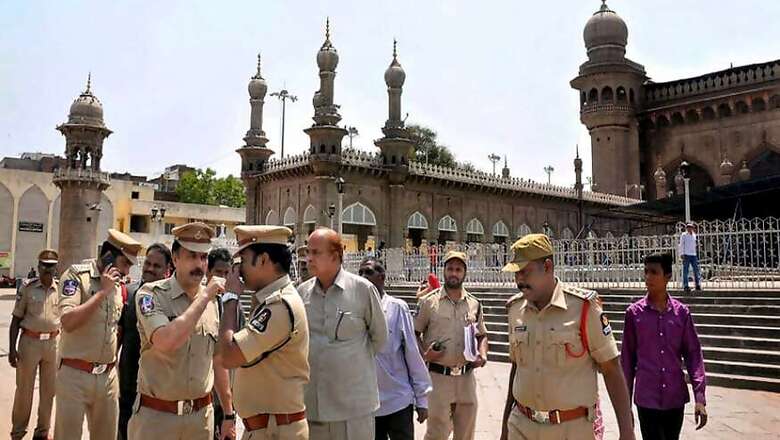
views
Hyderabad/New Delhi: The year was 2007. A powerful blast ripped apart the four centuries old Mosque in the heart of Hyderabad. Nine were killed and over 58 injured. All newspapers and television media had closely followed the blast and the men behind it. However, 11 years after the blast, all that the prosecution could prove was the blast and nothing else, noted the Special NIA judge, Ravinder Reddy.
In its 121-page verdict the only point that the prosecution was able to prove was the blast indeed happened on May 18, 2007, but who did it and why did it happen remains unanswered as the court has now acquitted all five accused in the case.
A look at the questions which the prosecution failed to prove:
Q) Did the blast happen?
Evidence proved the fact that on May 18, 2007 at 1:20pm the incident of bomb blast occurred at Mecca Masjid, resulting in death of 9 people and injuring 58.
Q) Was the extra -judicial confessional statement of Swami Aseemanand made before Maqbool bin Ali and Abdul Kaleem, voluntary or not?
The court has noted that in evidence it was shown that two other accused were sent to Ajmer jail even before the remand of Aseemanand. This fact was in conflict with what the testimony of public witness, Maqbool Bin Ali. Ali said that Devender Gupta and Lokesh Sharma were in Chanchalguda jail at the time when Aseemanand was kept in jail. The court ruled Maqbool’s testimony as “untrustworthy and false”.
Judge Reddy has noted that Abdul Kaleem was also interrogated and was subject to narco analysis test. Further, there was no documentary evidence or record shown to prove that Kaleem was in Chanchalguda jail when Aseemanand was in jail. Therefore, court held that even Kaleem “was untrustworthy and false”.
Q) What about the confessional statement of Aseemanand before the magistrate?
This court held that the confessional statement of Aseemanand is hit by section 26 of the Indian Evidence Act. It stated that confessional statement of Aseemanand was not a voluntary one which was recorded during the course of police custody. The statement was also retracted by the accused four months later
“There is no proper explanation as to why the public witness 226 was in a hurry to move an application before the chief judicial magistrate at New Delhi with the request to record the confessional statement of Aseemanand. He had ample opportunity to come down to Hyderabad and after expiry of the police custody of Aseemanand he could have moved an application before the jurisdictional court with a request to record the confessional statement of Aseemanand,” the court noted.
Q) Did the prosecution prove that Aseemanand was hiding in Atmalpur Bongla village assuming name of Swami Omkaranada and obtained ration card, voter ID from a competent authority beyond reasonable doubt?
The court has examined the e-ticket in the name of Aseemanand from Ujjain to Haridwar on November 11, 2010 and has noted that “had he intended to hide his name, he would have taken e-ticket in the name of Omkaranada instead of his original name”.
The court held that the prosecution failed to prove that Aseemanand was hiding in Haridwar under the name of Swami Omkaranada and that he moved dubious applications for ration card for enrollment in voter list.
Q) Did the prosecution prove that Devender Gupta displayed communal hatred being a pracharak of RSS?
The court categorically stated that “there was no record to show that there were communal charged speeches by Devender Gupta at Jamtara, Jharkhand. Nothing is on record to show Devender was booked in any case for his alleged speeches in Jamtara area".
In a brief observation on RSS, the court said, “The RSS is not a proscribed organisation, if any person works in it, it does not give any scope that he is communal and anti-social."
Q) Was the prosecution able to prove that Devender Gupta was in nexus with other accused (call records/mobile numbers)?
The court noted that the source of getting call data records has not been proved and thus the evidence is non-admissible.
Q) Did the prosecution failed to prove the above beyond reasonable doubt?
Yes, the prosecution failed to prove various documents linked to Devender Gupta beyond reasonable doubt.
Q) Did the prosecution prove identity of Lokesh Sharma as the one who purchased two mobile sets on April 24, 2007?
Both witnesses examined by the prosecution did not identify Lokesh Sharma in the court. The court noted that it was a weak piece of evidence and the proceedings conducted are not in consonance with Rule 34 of Criminal rule of Practice and circular orders. Even here the court noted that it was not proven beyond reasonable doubt.
Q) Did Bharath Mohanlal Rateshwar participate in various meetings of conspiracy and paid Rs 25000 to Sunil Joshi, who died, for procuring SIM cards and pistols, beyond reasonable doubt? Did deceased Sunil Joshi took Rs 40,000 from Rateshwar’s house for carrying out the blast?
To prove both these points, the prosecution had relied upon the statement of Aseemanand and the court discarded it as this was not proven because the confessional statement of Aseemanand was not admitted.
Q) Did the prosecution prove that Laxman Das Maharaj planted bomb at Mecca masjid?
The court noted that even Laxman Das Maharaj’s alleged confessional statement was not admissible because it was hit by Section 26 of the Indian Evidence Act. The court held that the prosecution failed to prove the planting of the bomb part as there “was no corroborative piece of evidence connecting Maharaj to the crime in the case”.
Q) Whether prosecution could prove the conspiracy of all accused in planting bomb at mecca masjid?
Judge Reddy has again noted that even this could not be proven beyond reasonable doubt. It held that Aseemanand indeed gave a statement but it was not voluntary and thus not admissible. There was no piece of evidence on record to show that Lokesh Sharma and others had purchased a mobile, which was recovered from unexploded IED at Mecca Masjid blast site.
Q) Whether the guilt of the accused was proven or not?
The court held that Devender Gupta, Lokesh Sharma, Swami Aseemanand, Bharath Mohanlal Rateshwar and Rajender Chowdary were not found guilty for the offence and was hence acquitted.




















Comments
0 comment